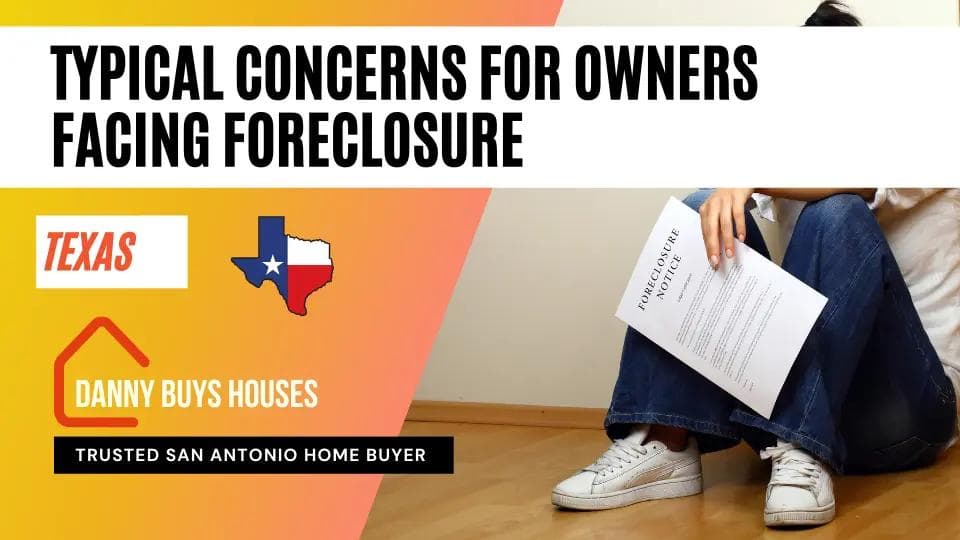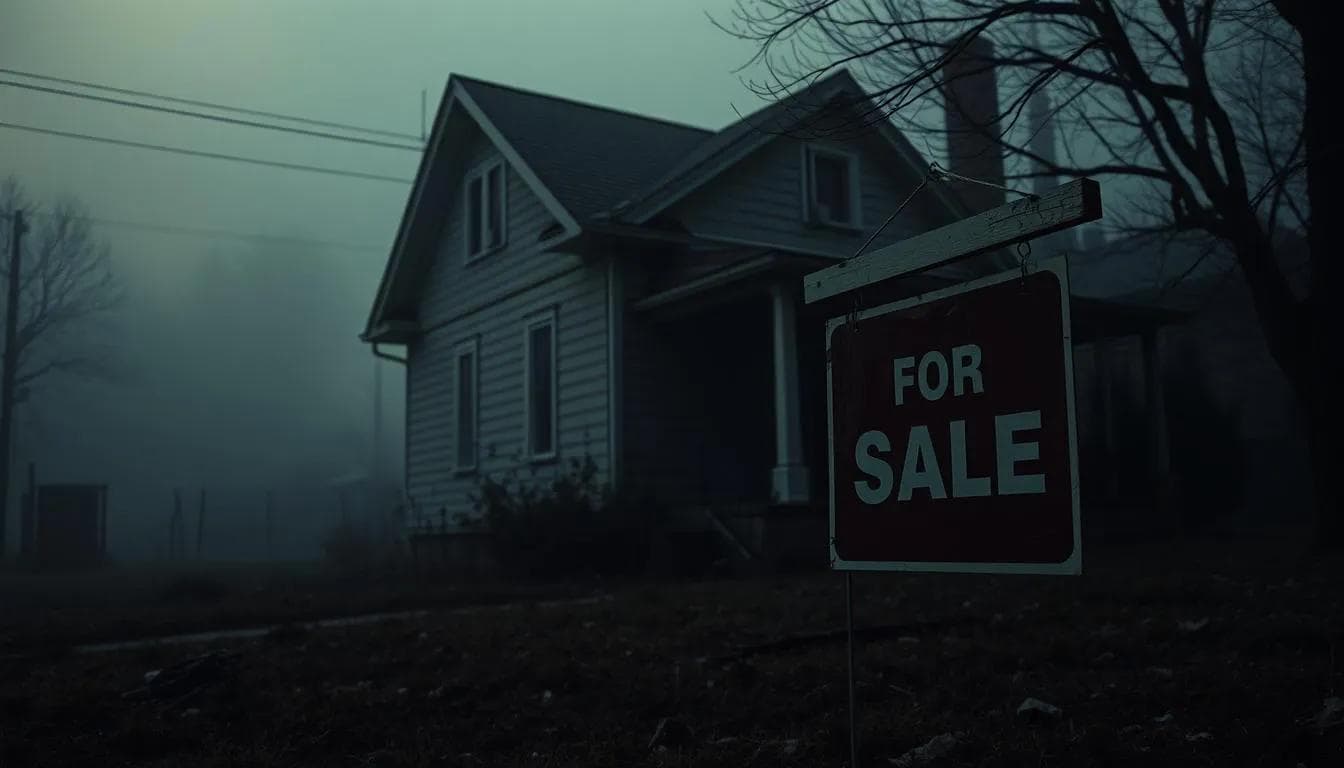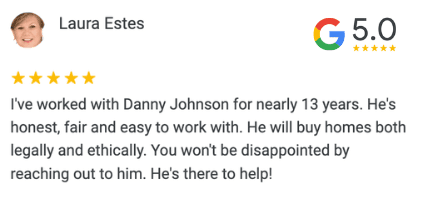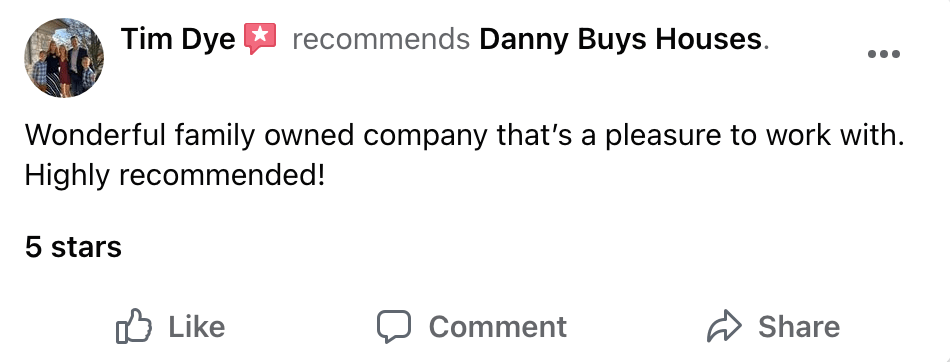
Typical Concerns for Owners Facing Foreclosure
By Danny Johnson | Updated 3/14/2025, 9:17:17 AM
Facing foreclosure is one of the most stressful situations for homeowners. Understand common concerns, options with lenders, and how to protect your property.
- Key Takeaways
- Typical Concerns of Owners Facing Foreclosure
- Credit Score Impact
- Property Rights and Ownership Status
- Legal Consequences and Timeline
- Common Mortgage Issues Contributing to Foreclosure
- Adjustable-Rate Mortgage Challenges
- Underwater Mortgages
- Second Mortgage Complications
- Legal Options for Homeowners in Foreclosure
- Alternative Solutions to Prevent Foreclosure
- Loan Modification Programs
- Refinancing Options
- Short Sale Possibilities
- Sell Fast to a Cash Home Buyer: Danny Buys Houses
🗂 Table of Contents
Seeing homeowners worried about foreclosure is heartbreaking. It feels like your home, your safe place, is slipping away. But remember, you're not alone, and there's hope.
Danny Buys Houses has helped many San Antonio families through tough times by providing a way to sell a house for cash quickly. Foreclosure isn't just losing a home. It's a complex issue that can affect your finances big time.
Let's talk about what's worrying you. From bad credit scores to legal troubles, we'll cover it all. My aim is to give you the knowledge to make smart choices about your property and future.

Foreclosure doesn't happen quickly. It starts when you miss mortgage payments. But here's the bright side: you have options, and knowing them is key to taking back control.
So, let's get into the details of foreclosure worries. We'll face your credit concerns, property rights, and legal fears head-on. Are you ready to explore this with me? Let's start!
Key Takeaways
- Foreclosure typically begins after 120 days of missed mortgage payments
- Credit scores can drop significantly due to foreclosure
- Homeowners have rights and options during the foreclosure process
- Communication with lenders early on can open up more alternatives
- Legal and financial advice is crucial when facing foreclosure
Typical Concerns of Owners Facing Foreclosure
Foreclosure is a scary word for homeowners. It brings up worries about credit scores, property rights, and legal troubles. Let's break down these concerns so you can understand what's really at stake.
Credit Score Impact
Your credit score takes a big hit when foreclosure happens. It can drop by 100 points or more! This mark stays on your credit report for 7 years. But don't panic - you can rebuild your credit over time. Just know that lenders and credit card companies will see this red flag for a while. To preserve what's left of their credit, many home owners prefer to sell to cash home buyers.

Property Rights and Ownership Status
When you're facing foreclosure, your home's market value matters less than your mortgage balance. If you have equity, you might have options. But if you're underwater on your loan, things get tricky. You could lose your investment and your home. Homeowners facing foreclosure often experience significant about losing their property rights.
Legal Consequences and Timeline
The foreclosure process can seem fast in Texas compared to other states.
Some states use judicial foreclosure, which involves courts and takes longer. Others use nonjudicial foreclosure, which is faster. A lawyer can help you understand your state's process and explore options like bankruptcy or loan modification. Remember, ignoring foreclosure notices only makes things worse. Act fast to protect your rights!
Common Mortgage Issues Contributing to Foreclosure
Homeowners face many mortgage challenges that can lead to foreclosure. It's important to understand these issues to manage financial risk. This helps avoid pitfalls in the housing market.
Adjustable-Rate Mortgage Challenges
Adjustable-rate mortgages (ARMs) have both good and bad sides. They start with lower interest rates but can change with the market. If rates go up, your monthly payments can too, catching you off guard.
This unpredictability raises credit risk. It can also lead to negative equity if property values drop.

Underwater Mortgages
An underwater mortgage happens when your home's value is less than what you owe. This makes it hard to refinance or sell your property. A GAO report shows widespread foreclosures have caused big losses in property value.
Second Mortgage Complications
Second mortgages can add to your financial risk. They often have higher interest rates. This makes it harder to get loan modifications.
Predatory lending can target vulnerable homeowners. This makes their financial situation even worse.
- Think about how a second mortgage will affect your credit score
- Know how property taxes and mortgage insurance increase your housing costs
- Be careful of seller financing options that might have bad terms
Dealing with these mortgage issues needs careful thought. You must consider underwriting standards, down payments, and how monetary policy affects interest rates. Homeowners facing these problems should look at all options to avoid foreclosure and protect their finances.
Legal Options for Homeowners in Foreclosure
Facing foreclosure can feel overwhelming, but you've got more options than you might think. Let's break down some legal paths that could help you keep your home or ease the transition if you need to move on.
Loan modification is a popular choice for homeowners behind on mortgage payments. It's like giving your loan a makeover. Your lender might lower your interest rate, stretch out the loan term, or even shrink the principal balance. This can make your monthly payments more manageable, even if you're dealing with financial hardship or job loss.
Another lifeline is forbearance. Think of it as hitting the pause button on your payments. If you're facing a temporary cash crunch, this could be your ticket to getting back on track. The FHA National Servicing Center offers various programs for homeowners with FHA-insured loans who are struggling financially.
If keeping your home isn't possible, consider a deed in lieu of foreclosure. You hand over your property to the lender, wiping out your mortgage debt. It's not ideal, but it's often less damaging to your credit than a foreclosed home.
- Refinancing to get a new loan with better terms
- Selling the property before foreclosure
- Filing for bankruptcy to halt the foreclosure process
Remember, understanding foreclosure and your rights is crucial. Beware of foreclosure scams promising quick fixes. Always seek advice from reputable sources. With the right approach, you can navigate this challenging time and work towards a better financial future.
Alternative Solutions to Prevent Foreclosure
Facing foreclosure can be scary, but don't panic! There are several alternatives that can help you keep your home or minimize the impact on your financial future. Let's explore some options that have helped many San Antonio homeowners avoid common foreclosure scenarios.
Loan Modification Programs
Loan modifications are a lifeline for homeowners struggling with monthly payments. These programs can change the terms of your mortgage to make it more affordable. For example, the Flex Modification program is available if Fannie Mae or Freddie Mac owns your loan.
About 50% of homeowners who apply for loan modifications see their monthly payments reduced. It may extend your loan term by 5-10 years on average.
Refinancing Options
Refinancing your mortgage could be a game-changer if you're facing financial difficulties. By securing a lower interest rate, you might reduce your monthly payments by an average of 20%. This can make it easier to keep up with payments and avoid foreclosure proceedings.
Remember, the type of foreclosure you're facing can impact your refinancing options, so it's crucial to act quickly.
Short Sale Possibilities
If refinancing or loan modifications aren't viable, a short sale could be your best bet. This allows you to sell your home for less than you owe on the mortgage, with the lender agreeing not to pursue the difference. About 70% of short sale applications are approved, and they typically take 3-6 months to process.
While it's not ideal, a short sale can help you preserve about 30% more equity compared to foreclosure. It causes less damage to your credit score.
Remember, these are just a few of the reasons why homeowners face foreclosure and the options available to them. Whether you're dealing with a nonjudicial foreclosure or other type of foreclosure, understanding your choices is crucial. Don't let financial hardships make it difficult to keep your home - explore these alternatives and take action today!
Sell Fast to a Cash Home Buyer: Danny Buys Houses
You can avoid foreclosure and retain some of your equity by selling to a cash house buying company. This option is available if you have some equity. You will be able to likely close within a week and be done with the whole situation.
If you would like to find out how much we can offer for your house, give us a call.
Frequently Asked Questions
In this section we will answer the most common questions to what to expect when facing foreclosure in Texas
What is the timeline for foreclosure in Texas?
In Texas, the foreclosure process can be completed relatively quickly due to its non-judicial nature. Typically, it takes about 60 to 90 days from the time a borrower defaults on their mortgage payment until the home is sold at auction.
What are my options to avoid foreclosure in Texas?What are my options to avoid foreclosure in Texas?
Homeowners facing foreclosure in Texas have several options including loan modification, refinancing, short sale, deed in lieu of foreclosure, or filing for bankruptcy. Its important to communicate with your lender and possibly seek advice from a housing counselor.
How does non-judicial foreclosure work in Texas?
Non-judicial foreclosures in Texas do not require court action. The process involves the lender sending a notice of default and intent to accelerate, followed by a notice of sale at least 21 days before the auction date. The property is then sold at a public auction without judicial oversight.
Can I challenge a wrongful foreclosure in Texas?
Yes, you can challenge a wrongful foreclosure by filing a lawsuit against your lender if you believe there has been an error or violation during the process. Common grounds include improper notice or failure to comply with state laws governing foreclosures.
What happens after my home is sold at a foreclosure auction in Texas?
After your home is sold at auction, you may receive an eviction notice requiring you to vacate the property. The new owner must go through formal eviction proceedings if you do not leave voluntarily. Additionally, any remaining balance on your mortgage (deficiency) could become your responsibility unless waived by the lender.

AUTHOR
Danny Johnson
Owner and Founder at Danny Buys Houses
Danny Johnson is an experienced real estate investor who has been buying houses for cash since 2003. As owner of Danny Buys Houses, Danny's goal is to help homeowners sell their house fast, regardless of the situation, so they can move on with their life.
Danny has been featured in publications such as Forbes, Realtor.com, BiggerPockets, Yahoo Finance, US News, and more. He is also the author of the book 'Flipping Houses Exposed'.




